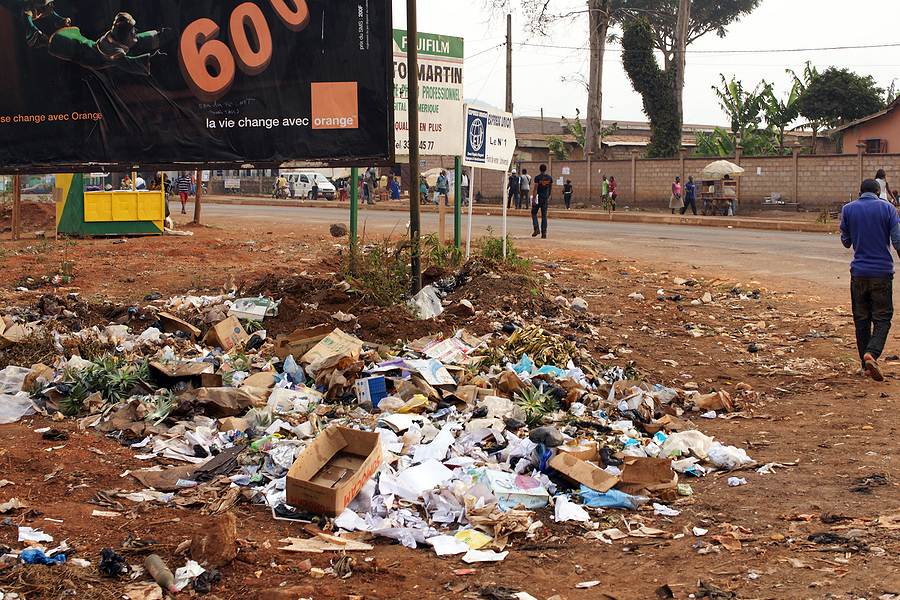
E-Waste in Ghana Found to be Generated from Both Outside and Internal Sources
Every year, a staggering 30,000 tons of electronic waste are shipped to the African nation of Ghana. Primarily originating in Europe and North America, e-waste has become a major problem in impoverished countries.
Being the second most populated continent, vast amounts of waste are being produced daily in African countries, as well. This includes materials that range from organic and inorganic to biodegradable and non-biodegradable trash, creating a major environmental challenge for the area and its inhabitants.
In a recent report by the United Nations Environment Programme, it was revealed that an enormous 85% of e-waste dumped in West Africa was generated domestically.
To deal with the massive amounts of waste accruing on a daily basis, locals burn discarded electronics (or e-waste) in huge open air wastelands. This is to quickly access the raw materials these unwanted items contain, such as copper and other valuable metals. Scrap metal is then sold on the market, and has become a way of life for many.
A Major Environmental and Health Concern
For the past 50 years, technologies have been innovated to extract precious metals from electronics or copper wire in an eco-friendly way. Unfortunately, these methods are too costly for the recyclers of Ghana who lack financial resources. Even when affordable, these laborers cannot keep up with the speed achieved by burning wire insulation off through fire.
Smoke emissions contain environmental contaminants such as dioxin, heavy metals and other toxins that are incredibly hazardous to human health. It is undeniable that these dump sites pose a danger for air quality, human beings, and wildlife.
Recently, evidence has emerged which indicates that even women’s breast milk, in certain areas of Africa, are being contaminated due to the pollution from e-waste.
At the Agbogbloshie e-waste dump on the outskirts of Accra, Sala Muntala is a local woman who has a job as a drink seller. She is seven months pregnant, and expresses concern over her unborn child, due to working at this site.
She reports feeling unwell, “I have stomach aches, my chest hurts, but I can’t escape the smoke because it surrounds me” she explains.
AMP Steps In
The Agbogbloshie Makerspace Project, or AMP, is a revolutionary effort that has been co-led by Ghanaian-American architect, Osseo-Asare. This initiative seeks to transform the views and economic status of the area. “Let’s arm them with information so that they can do things better.”
AMP started by building a small location, nestled among existing local recycling businesses. To gain insight into the site and its workers, the organization spent months getting to know the people and the culture. AMP discovered that most of the employees were migrants with limited educational backgrounds, many of which had few connections to bigger cities, Osseo-Asare stated.
“They’re here to make money, quickly. If we want people to do this work in a safe and environmentally sound way, [making a living] has to be part of [it].”
Scrapper Smartphone App
AMP is excited to announce the launch of a new digital platform, a tool built to be loaded onto scrap workers’ smartphones. The primary purpose of this campaign is to create a Twitter-like scrap marketplace that allows Ghanaian scrappers to purchase metal easily. The platform also includes critical health and safety information for workers.
“If we beat people over the head with safe e-waste recycling, it will never work,” says Osseo-Asare. “But if you help them find business, and you give them some interesting pieces of info regarding safety, they might look at it.”
Making a positive contribution to the Agbogbloshie community, AMP is committed to creating new and innovative products with the junk sold at the site. Instead of only recycling these items, AMP is working to repurpose them too.
Locals Create New Things from Waste Items
Makafui Awuku is the founder and executive director of Mckingtorch Creatives. He uses plastics sourced from waste to create sustainable projects.
Mckingtorch Creatives, “has collected over 120,000 plastic waste from homes, offices and the streets of Accra, and engages over 200 volunteers. Mckingtorch Creatives makes sandals, rubbish bins, flower pots, wall artworks, laundry baskets, bracelets and other products from plastic waste and has exported some of its products to 7 countries including the U.K., Germany, France, and the Netherlands.”
Awuku’s goal is to move away from simply collecting and dumping, to create a more purposeful use for these waste products. Along with e-waste, Plastic waste has also become an increasing problem in Ghana.
Plastic bottles are “all over the place” he describes. Every week he travels to local residents homes and collects plastic bottles for reuse projects. Awuku proudly states that his company currently employs seven individuals.
“We are not just creating products to sell, we are trying to provoke young Africans to look for solutions.”
Agbogbloshie, A Complex Approach
Finding a resolution to the problems which plague Africa, but specifically Agbogbloshie, is not a simple solution. This site serves as a key economic and environmental factor in Accra, and ceasing its operations would merely move activities elsewhere.
“You have to change how people perceive the place,” Osseo-Asare explains.
“Once they see the potential, they understand that the solution comes from Agbogbloshie and not from outside.”
As activist groups within the country unite with those from around the world, many are working together to tackle the looming issue of the overwhelming amounts of waste that are left for the people of Africa to process.
“Patience, as well as hope, should take care of the rest.”
